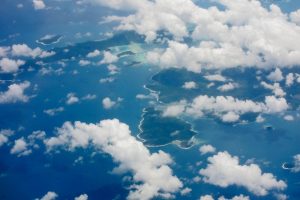Indonesia has invited officials from five other Southeast Asian nations to meet in February to discuss a possible joint response to China’s persistent assertiveness in the South China Sea.
According to a report yesterday by BenarNews, Vice Adm. Aan Kurnia, the head of Indonesia’s Maritime Security Agency (generally known as Bakamla) told reporters that he’d invited counterparts from Brunei, Malaysia, the Philippines, Singapore, and Vietnam to a meeting in February 2022 to “share experiences and foster brotherhood.”
Four of the five nations have unresolved maritime and territorial disputes with China, and have experienced the hard edge of its growing naval and maritime power in the South China Sea. The fifth, Singapore, while having no direct territorial stake in the South China Sea, has a similarly strong stake in the preservation of free and open international sea lanes.
While Aan did not refer to China by name – a customary nicety observed by most Southeast Asian governments, who are fearful of disrupting fruitful economic ties with Beijing – he said that it is important for Southeast Asian claimants “to present a coordinated approach” in matters related to the South China Sea, and “how to respond in the field when we face the same ‘disturbance,'” Bakamla reported.
Over the past decade, the Southeast Asian claimants, the Philippines and Vietnam in particular, have experienced increasing friction with China, as Beijing has asserted its sovereignty over disputed areas of the South China Sea and constructed artificial islands on features in the Spratly Islands.
These assertive actions have also come increasingly to target Indonesia, which has long maintained that it is not a legal claimant in the South China Sea. Over the past five years, China has sent fishing large fishing boats, often accompanied by coast guard and maritime militia vessels, into Indonesia’s exclusive economic zone (EEZ) near the Natuna islands, which Beijing claims as part of its expansive “nine-dash line” maritime claim. In December 2019 and January 2020, for instance, nearly 60 vessels crossed into Indonesia’s EEZ.
In the last few months of 2021, the two nations have engaged in a low-level stand-off over an oil rig prospecting near the Natuna islands inside Indonesia’s EEZ. As I noted last month, this culminated in Beijing formally requesting that Jakarta to stop drilling for oil and gas in the area, a demand that was met with a curt refusal on the part of the Indonesian government, which successfully wrapped up the six-month drilling project last week.
But as Evan Laksmana of the National University of Singapore’s Lee Kuan Yew School of Public Policy argued in an article earlier this month, the incident, which transgressed a previous Indonesian “red line,” showed the extent to which the country’s policymakers largely remain “in denial about Beijing’s increasingly assertive actions” in the waters around the Natunas. “While Indonesia is not a claimant state in the dispute,” he wrote, “China has been treating Jakarta much like its neighbors with claims in the area. Beijing has applied grey zone tactics to gradually change the strategic equation at sea and beyond without provoking an outright violent war.”
While it is hard to know exactly what concrete outcomes that the February meeting will bring, it represents a welcome step toward the coordination among Southeast Asian nations facing China’s challenge in the South China Sea. While the various maritime-facing nations of Southeast Asia share variations on the same challenge, their cooperation has been undermined by a lack of coordination and unity, a corollary of both clotted policymaking processes and the unresolved maritime and territorial disputes that still exist between these Southeast Asian claimants.
Indonesia’s call for unity may also signal a dawning recognition of the seriousness of the challenge posed by China within the country’s EEZ, and the country’s inability to manage it alone. It could therefore be the first sign that Indonesian policymakers – or at least those in closest proximity to the situation on the ground in the Natuna region – are awakening to the denial of the past decade. As such, these efforts warrant close attention in the months and years to come.

































